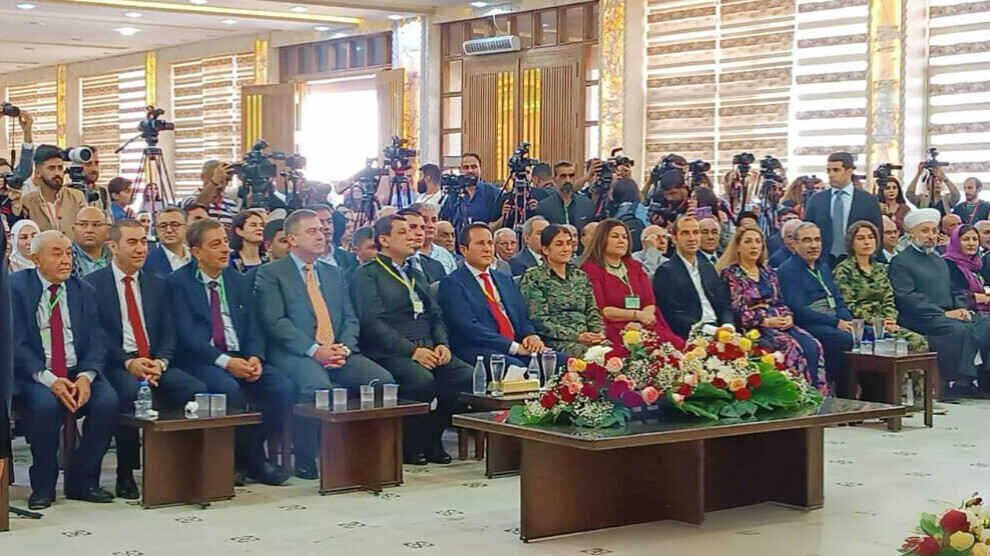The meaning and future of the historic conference
The conference held in Qamishlo stands as a serious and organized response to a century of loneliness, denial, and fragmentation imposed on a people.
The conference held in Qamishlo stands as a serious and organized response to a century of loneliness, denial, and fragmentation imposed on a people.

On the lands of Rojava, the Kurdish people once again sought to weave their own future upon stones worn down by time and war. Representatives from different regions of North and East Syria, from the diaspora, and from war-torn parts of the Middle East gathered to mark a historic moment. The Rojava Kurdish Unity and Common Stance Conference was not merely a meeting, but rather a new milestone in a long journey echoing in the collective memory, an insistent and renewed expression of the pursuit of unity and freedom.
The conference, convened on 26 April 2025 in Qamishlo, was a direct response to more than a century of fragmentation endured by the Kurdish people. In these lands, exhausted by war, occupation, and displacement, different Kurdish parties, women's organizations, social movements, and independent activists came together. Their aim was to build a vision that would guarantee the Kurdish people a shared voice in the future of Syria. The conference took shape as the fruit of the social gains born from the Rojava Revolution and the collective memory forged through war and resistance. This gathering represents one of the first major political initiatives after the overthrow of Syria's repressive regime on 8 December 2024.
A continuation of memory
The collapse of the Baath regime marked a historic turning point for Syria. The system that had suppressed ethnic, religious, and social diversity for decades crumbled, leaving behind millions of deaths, countless exiles, and a land reduced to ruins. In the aftermath, a search for a new social contract began. The Kurdish people saw this historical opportunity not only as a chance to determine their own destiny but also as a responsibility for building a democratic future for Syria.
The main idea emphasized in the conference declaration was clear: Kurdish identity would be protected within the framework of a multi-ethnic, multi-cultural, and multi-national Syria; the national rights of the Kurdish people would be constitutionally guaranteed. This approach responded not only to the pains of the past but also served as a safeguard against potential future crises.
A democratic and free future
The conference embraced a political vision rooted in the principles of human rights, gender equality, and women's liberation. The strong participation of women’s movements, in particular, reflected the enduring legacy of the egalitarian spirit of the Rojava Revolution. According to the final declaration:
-The Kurdish people will be represented in Syria’s new political structure in an effective and equal manner,
-Kurdish rights will be guaranteed through a constitution that excludes no segment of society,
-A decentralized state model will be supported.
These principles can be seen not only as a manifesto for the Kurdish people but also as a call for peace for all the peoples of Syria.
Internal and external dynamics
This conference is not only a domestic political development but also a regional message. The Kurdish people seek to exist in the construction of the new Syria not as a passive element, but as a founding political will. This is likely to be perceived as a threat by regional powers. For instance:
-Turkey defines any recognition of Kurdish status as a “red line.”
-Iran is concerned that the Kurdish movement in Syria may influence its own Kurdish population.
-The Syrian regime remains unwilling to abandon its centralized structure.
The conference’s emphasis on peace and dialogue is being closely monitored in Western capitals and within United Nations (UN) circles. This diplomatic tone, aimed at enhancing the international legitimacy of the Kurdish people, represents a significant step toward securing a role in shaping Syria’s future.
Necessity and responsibility
As clearly stated in the final declaration, the conference aims to form a unified Kurdish delegation as soon as possible and to initiate negotiations with relevant parties. This marks the beginning of translating words into action. The call for unity will no longer remain confined to declarations, evolving into concrete steps via political representation, defensive structures, and diplomatic engagement.
This process will be tested by internal contradictions and external pressures. It will require patience and determination. Perhaps most importantly, this emerging call from Rojava may serve as a beacon of hope for a democratic future, not only for the Kurds but for all the peoples of the Middle East.
A new page in history
The conference held in Qamishlo stands as a serious and organized response to a century of loneliness, denial, and fragmentation endured by a people. This historic gathering in Rojava seeks not only to address the crisis of today, but also to leave a mark for the peoples of tomorrow. Unity is not merely a word; it demands responsibility, sacrifice, and long-term strategic patience. If the Kurdish people can draw lessons from this historic moment, they may move beyond the tragedy of being a fragmented nation and become pioneers of regional peace and democratic transformation. The coming period will reveal whether this conference becomes a mere historical remark or a decisive turning point in the course of history.
This is not only a lesson for the Kurdish people but for all of humanity: when a people decide to reclaim their destiny, even the heaviest chains in the world can be broken. When history is written, this moment may be defined by a single sentence: ‘In their darkest trial, the Kurds chose unity over division.’